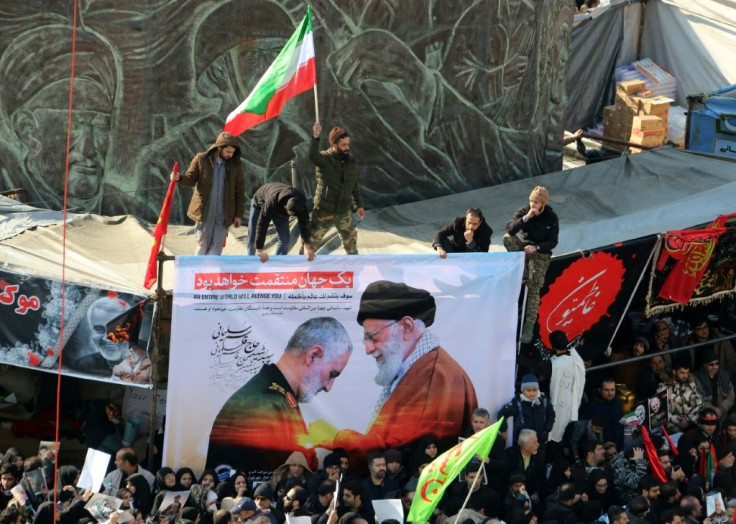Iran's Neighbors In Caucasus Republics Wary Of Fallout From Soleimani’s Killing

KEY POINTS
- Long time enemies Armenia and Azerbaijan are united in their support for Iran
- Azerbaijan is a Shiite Muslim state like Iran
- Georgia has come out in favor of the U.S.
Iran’s neighbors to the northwest, the Caucasus states, expressed grave concerns over the killing of Gen. Qassem Soleimani by a U.S. drone strike late last week.
While Armenia and Azerbaijan have supported Teheran in the aftermath of the airstrike, Georgia has stood by its allies in Washington.
The foreign ministers of Armenia and Azerbaijan – neighboring states that have engaged in conflict with each other – each called Iranian Foreign Minister Javad Zarif and both expressed their support for Iran while criticizing the U.S. in almost identical language.
Armenian Foreign Minister Zohrab Mnatsakanyan “expressed condolences to the government and people of Iran on the demise of the high ranking Iranian official,” while his Azerbaijani counterpart Elmar Mammadyarov “expressed deepest condolences to the leadership and the people of the Islamic Republic of Iran on the death of general Qassem Soleimani.”
The Armenian Foreign Ministry said: “We are deeply concerned about the recent events in Baghdad, which also led to human casualties. They can further increase the threat to peace in the region and destabilize the situation in the Middle East and beyond. Armenia is in favor of defusing the situation exclusively by peaceful means.”
Mammadyarov added: “The Azerbaijani side calls on all parties involved to refrain from violence and be committed to strengthen regional security.”
Ilgar Ibrahimoglu, a leading imam in Baku, Azerbaijan, described Soleimani as a “martyr.”
In Nagorno-Karabakh, which is now a protectorate of Armenia, the language against the U.S. was more strident.
“The murder of Soleimani is reckless adventurism,” said Arshavir Garamyan, the chairman of Nagorno-Karabakh’s security council. “Soleimani was committed to serving the interests of his country and people, therefore vengeance is [a] matter of honor for the state, people, and soldiers of Iran, in particular for its intelligence and secret services.”
Armenia and Azerbaijan have both maintained fairly close ties with Iran. Azerbaijan, like Iran, is a majority Shiite Muslim nation, while Armenians have close linguistic and ethnological links to Iran.
In Georgia, however, the reaction was notably different.
“We condemned [the] recent violence [and] provocative attack [on] the U.S. Embassy in Baghdad. U.S. has [a] legitimate right to defend its citizens,” tweeted Foreign Minister David Zalkaliani. “It is also time for diplomacy to ease tensions.”
Georgian political scientist Tengiz Pkhaladze suggested the U.S. may now be more vulnerable to terror attacks – as well as places regarded as U.S. allies.
“Terrorist attacks can be committed against Americans in any country, and Georgia can also be considered one of these places,” he warned. Therefore, Georgia needs to strengthen anti-terrorism measures.”
An Armenian political scientist named Suren Sargsyan commented that in the wake of the drone strike in Baghdad, the U.S. will be dealt “a blow from Iran that will possibly be as painful and adequate as the murder of Soleimani.”
Sargsyan also said he expects the murder will unify Iran. “This operation [to kill Soleimani] won’t change Iran’s policy and won’t restrain Iran in the region,” he said. “As a result of this, the people of Iran will unite around the government, meaning there will be less internal upheaval.”
Sargsyan warned that although there won’t be a direct war between Iran and the U.S., “there will be more proxy wars” and their geography will expand.
“Those wars will be seen more in Syria, Iraq and possibly Lebanon where [Iran-backed] Hezbollah is based,” he said. “Terrorist groups will obviously take advantage of the situation. This [will serve] as a new and wide opportunity for the half-dead [ISIS], which is an ideological group and will be reborn.”
As for his native Caucasus, Sargsyan said the main risk for Armenia would be the safety of the many Armenians who live abroad, particularly in Syria and Lebanon.
“The possible proxy clashes in the South Caucasus, including in the territory of Armenia imply another risk,” he added. “It seems as though the special services of the U.S. and Iran have been taking advantage of Armenia’s territory to go against each other for a long time now.”
© Copyright IBTimes 2025. All rights reserved.





















